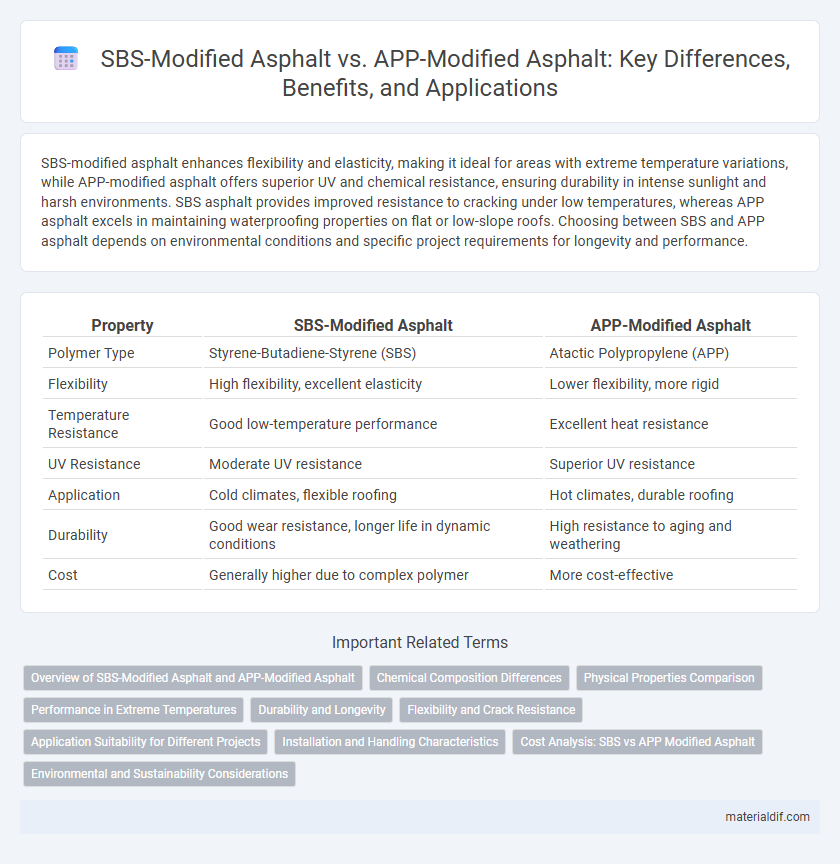SBS-modified asphalt enhances flexibility and elasticity, making it ideal for areas with extreme temperature variations, while APP-modified asphalt offers superior UV and chemical resistance, ensuring durability in intense sunlight and harsh environments. SBS asphalt provides improved resistance to cracking under low temperatures, whereas APP asphalt excels in maintaining waterproofing properties on flat or low-slope roofs. Choosing between SBS and APP asphalt depends on environmental conditions and specific project requirements for longevity and performance.
Table of Comparison
| Property | SBS-Modified Asphalt | APP-Modified Asphalt |
|---|---|---|
| Polymer Type | Styrene-Butadiene-Styrene (SBS) | Atactic Polypropylene (APP) |
| Flexibility | High flexibility, excellent elasticity | Lower flexibility, more rigid |
| Temperature Resistance | Good low-temperature performance | Excellent heat resistance |
| UV Resistance | Moderate UV resistance | Superior UV resistance |
| Application | Cold climates, flexible roofing | Hot climates, durable roofing |
| Durability | Good wear resistance, longer life in dynamic conditions | High resistance to aging and weathering |
| Cost | Generally higher due to complex polymer | More cost-effective |
Overview of SBS-Modified Asphalt and APP-Modified Asphalt
SBS-modified asphalt incorporates styrene-butadiene-styrene block copolymers, enhancing flexibility, elasticity, and temperature resistance, making it ideal for cold climates and heavy traffic applications. APP-modified asphalt uses atactic polypropylene polymers, which improve UV resistance, aging properties, and stiffness, suitable for hot climates and areas requiring high durability. Both modifications enhance asphalt performance but target different environmental stresses and usage conditions.
Chemical Composition Differences
SBS-modified asphalt incorporates styrene-butadiene-styrene block copolymers, providing enhanced elasticity and temperature resistance through its thermoplastic elastomer structure. APP-modified asphalt uses atactic polypropylene, offering superior heat resistance and UV stability due to its crystalline polymer composition. The chemical differences between SBS and APP result in distinct performance characteristics, with SBS enhancing flexibility and APP improving durability under high temperatures.
Physical Properties Comparison
SBS-modified asphalt exhibits superior elasticity and flexibility due to its styrene-butadiene-styrene polymer content, enhancing resistance to cracking under low temperatures and repeated traffic loads. APP-modified asphalt, incorporating atactic polypropylene, demonstrates higher softening points and improved rutting resistance, making it ideal for high-temperature applications. Both modifiers improve the physical properties of asphalt, but SBS offers better performance in thermal cracking resistance while APP excels in temperature durability and stiffness.
Performance in Extreme Temperatures
SBS-modified asphalt demonstrates superior flexibility and elasticity at low temperatures, reducing the risk of cracking in cold climates, while maintaining strong adhesion and resistance to deformation under high temperatures. APP-modified asphalt offers excellent thermal stability and UV resistance, making it ideal for extreme heat conditions, but is less flexible in cold environments compared to SBS. Selecting between SBS and APP modification depends on the specific climate requirements, with SBS preferred for regions experiencing severe cold and APP suited for high temperature applications.
Durability and Longevity
SBS-modified asphalt exhibits superior elasticity and flexibility, enhancing crack resistance and extending pavement lifespan under varying temperature conditions. APP-modified asphalt offers excellent UV resistance and waterproofing properties, contributing to its durability in hot climates and prolonged exposure to sunlight. SBS-modified asphalt typically outperforms APP in freeze-thaw durability, making it more suitable for regions with significant temperature fluctuations.
Flexibility and Crack Resistance
SBS-modified asphalt offers superior flexibility due to its elastomeric properties, allowing it to withstand significant deformation without cracking. APP-modified asphalt provides strong resistance to aging and weathering but is comparatively stiffer, which can reduce its crack resistance in low temperatures. The enhanced elasticity of SBS-modified asphalt makes it the preferred choice for applications requiring high flexibility and enhanced crack resistance.
Application Suitability for Different Projects
SBS-modified asphalt is highly suitable for roofing and paving projects requiring flexibility and enhanced resistance to temperature variations due to its elastomeric properties, making it ideal for areas with extreme weather fluctuations. APP-modified asphalt excels in waterproofing and durability for flat roofs and highways, providing superior resistance to UV radiation and oxidation. Selecting between SBS and APP-modified asphalt depends on project-specific demands such as flexibility, temperature tolerance, and long-term exposure conditions.
Installation and Handling Characteristics
SBS-modified asphalt offers greater flexibility and elasticity, making it easier to handle and install in colder temperatures and complex roof designs. APP-modified asphalt provides superior heat resistance and UV stability, allowing for faster installation through torch application without compromising material integrity. Both types require skilled labor, but SBS membranes demand careful temperature control during installation to maintain optimal performance.
Cost Analysis: SBS vs APP Modified Asphalt
SBS-modified asphalt typically incurs higher initial costs due to its superior elasticity and temperature resistance, making it ideal for regions with extreme weather fluctuations. APP-modified asphalt offers a more cost-effective solution with enhanced UV and aging resistance, making it suitable for long-term applications in warmer climates. Life-cycle cost analysis reveals SBS asphalt may require less frequent maintenance, while APP asphalt provides budget-friendly performance with moderate upkeep expenses.
Environmental and Sustainability Considerations
SBS-modified asphalt offers enhanced flexibility and crack resistance, which extends pavement lifespan and reduces maintenance frequency, thereby lowering overall environmental impact. APP-modified asphalt provides superior UV and heat resistance, contributing to longer durability in harsh climates and minimizing resource consumption for repairs. Both types support sustainability by improving pavement performance, but SBS's elasticity often translates to better adaptation to temperature fluctuations, promoting energy-efficient road construction and maintenance.
SBS-Modified Asphalt vs APP-Modified Asphalt Infographic

 materialdif.com
materialdif.com